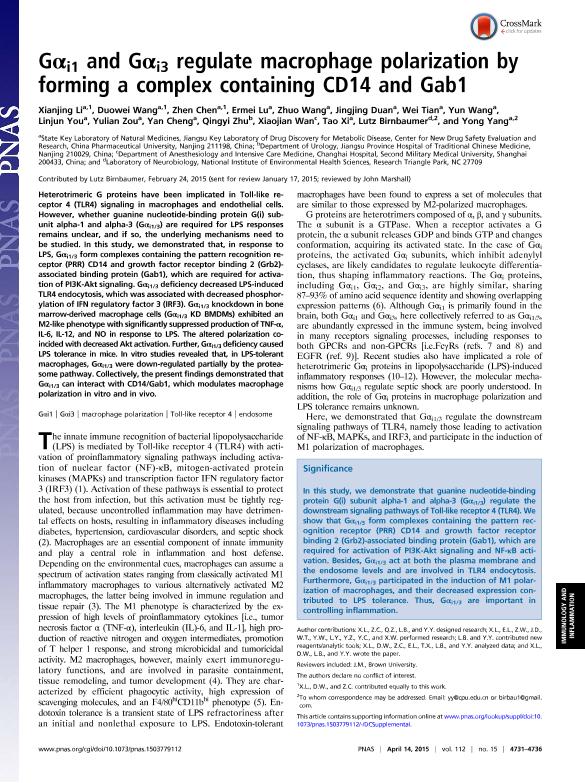Mostrar el registro sencillo del ítem
dc.contributor.author
Li, Xiaolin

dc.contributor.author
Wang, Duowei
dc.contributor.author
Chen, Zen
dc.contributor.author
Lu, Ermei
dc.contributor.author
Wang, Zhuo
dc.contributor.author
Duan, Jingjing
dc.contributor.author
Tian, Wei
dc.contributor.author
Wang, Yun
dc.contributor.author
You, Linjun
dc.contributor.author
Zou, Yulian
dc.contributor.author
Cheng, Yan
dc.contributor.author
Zhu, Qingyi
dc.contributor.author
Wan, Xiaojian
dc.contributor.author
Xia, Tao
dc.contributor.author
Birnbaumer, Lutz

dc.contributor.author
Yang, Yong
dc.date.available
2020-01-03T19:42:25Z
dc.date.issued
2015-04-14
dc.identifier.citation
Li, Xiaolin; Wang, Duowei; Chen, Zen; Lu, Ermei; Wang, Zhuo; et al.; Galphai1 and Galphai3 regulate macrophage polarization by forming a complex containing CD14 and Gab1; National Academy of Sciences; Proceedings of the National Academy of Sciences of The United States of America; 112; 15; 14-4-2015; 4731-4736
dc.identifier.issn
0027-8424
dc.identifier.uri
http://hdl.handle.net/11336/93463
dc.description.abstract
Heterotrimeric G proteins have been implicated in Toll-like receptor 4 (TLR4) signaling in macrophages and endothelial cells. However, whether guanine nucleotide-binding protein G(i) subunit alpha-1 and alpha-3 (Gαi1/3) are required for LPS responses remains unclear, and if so, the underlying mechanisms need to be studied. In this study, we demonstrated that, in response to LPS, Gαi1/3 form complexes containing the pattern recognition receptor (PRR) CD14 and growth factor receptor binding 2 (Grb2)-associated binding protein (Gab1), which are required for activation of PI3K-Akt signaling. Gαi1/3 deficiency decreased LPS-induced TLR4 endocytosis, which was associated with decreased phosphorylation of IFN regulatory factor 3 (IRF3). Gαi1/3 knockdown in bone marrow-derived macrophage cells (Gαi1/3 KD BMDMs) exhibited an M2-like phenotype with significantly suppressed production of TNF-α, IL-6, IL-12, and NO in response to LPS. The altered polarization coincidedwith decreased Akt activation. Further, Gαi1/3 deficiency caused LPS tolerance in mice. In vitro studies revealed that, in LPS-tolerant macrophages, Gαi1/3 were down-regulated partially by the proteasome pathway. Collectively, the present findings demonstrated that Gαi1/3 can interact with CD14/Gab1, which modulates macrophage polarization in vitro and in vivo.
dc.format
application/pdf
dc.language.iso
eng
dc.publisher
National Academy of Sciences

dc.rights
info:eu-repo/semantics/openAccess
dc.rights.uri
https://creativecommons.org/licenses/by-nc-sa/2.5/ar/
dc.subject
ENDOSOME
dc.subject
GΑI1
dc.subject
GΑI3
dc.subject
MACROPHAGE POLARIZATION
dc.subject
TOLL-LIKE RECEPTOR 4
dc.subject.classification
Bioquímica y Biología Molecular

dc.subject.classification
Ciencias Biológicas

dc.subject.classification
CIENCIAS NATURALES Y EXACTAS

dc.title
Galphai1 and Galphai3 regulate macrophage polarization by forming a complex containing CD14 and Gab1
dc.type
info:eu-repo/semantics/article
dc.type
info:ar-repo/semantics/artículo
dc.type
info:eu-repo/semantics/publishedVersion
dc.date.updated
2019-10-28T18:25:11Z
dc.journal.volume
112
dc.journal.number
15
dc.journal.pagination
4731-4736
dc.journal.pais
Estados Unidos

dc.description.fil
Fil: Li, Xiaolin. China Pharmaceutical University. Center for New Drug Safety Evaluation and Research; China
dc.description.fil
Fil: Wang, Duowei. China Pharmaceutical University. Center for New Drug Safety Evaluation and Research; China
dc.description.fil
Fil: Chen, Zen. China Pharmaceutical University. Center for New Drug Safety Evaluation and Research; China
dc.description.fil
Fil: Lu, Ermei. China Pharmaceutical University. Center for New Drug Safety Evaluation and Research; China
dc.description.fil
Fil: Wang, Zhuo. China Pharmaceutical University. Center for New Drug Safety Evaluation and Research; China
dc.description.fil
Fil: Duan, Jingjing. China Pharmaceutical University. Center for New Drug Safety Evaluation and Research; China
dc.description.fil
Fil: Tian, Wei. China Pharmaceutical University. Center for New Drug Safety Evaluation and Research; China
dc.description.fil
Fil: Wang, Yun. China Pharmaceutical University. Center for New Drug Safety Evaluation and Research; China
dc.description.fil
Fil: You, Linjun. China Pharmaceutical University. Center for New Drug Safety Evaluation and Research; China
dc.description.fil
Fil: Zou, Yulian. China Pharmaceutical University. Center for New Drug Safety Evaluation and Research; China
dc.description.fil
Fil: Cheng, Yan. China Pharmaceutical University. Center for New Drug Safety Evaluation and Research; China
dc.description.fil
Fil: Zhu, Qingyi. Jiangsu Province Hospital of Traditional Chinese Medicine. Departament of Urology; China
dc.description.fil
Fil: Wan, Xiaojian. Second Military Medical University. Department of Anesthesiology and Intensive Care Medicine, Changhai Hospita; China
dc.description.fil
Fil: Xia, Tao. China Pharmaceutical University. Center for New Drug Safety Evaluation and Research; China
dc.description.fil
Fil: Birnbaumer, Lutz. Consejo Nacional de Investigaciones Científicas y Técnicas; Argentina. National Institute of Environmental Health Sciences. Laboratory of Neurobiology, ; Estados Unidos
dc.description.fil
Fil: Yang, Yong. China Pharmaceutical University. Center for New Drug Safety Evaluation and Research; China
dc.journal.title
Proceedings of the National Academy of Sciences of The United States of America

dc.relation.alternativeid
info:eu-repo/semantics/altIdentifier/url/https://www.pnas.org/content/112/15/4731
dc.relation.alternativeid
info:eu-repo/semantics/altIdentifier/url/https://www.ncbi.nlm.nih.gov/pmc/articles/PMC4403188/
dc.relation.alternativeid
info:eu-repo/semantics/altIdentifier/doi/http://dx.doi.org/10.1073/pnas.1503779112
Archivos asociados
